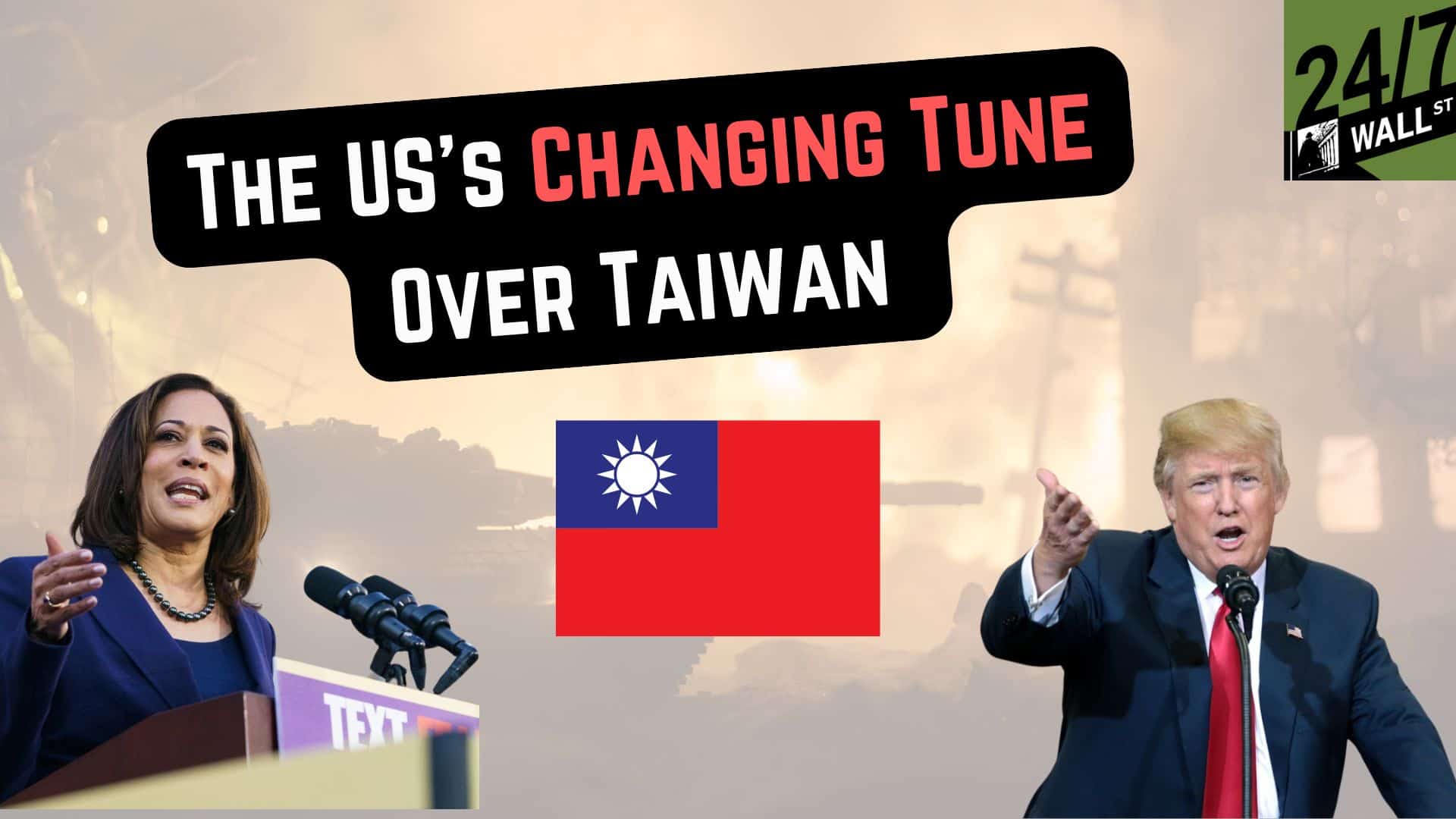
Key Points:
- Strategic ambiguity on Taiwan may be outdated due to increasing China tensions.
- Taiwan isn’t a major focus in the current U.S. election but could become crucial soon.
- U.S. public’s aversion to prolonged conflicts may impact future involvement in global issues.
- Smart investors are looking ahead to 2025 and placing bets, with a few being called ‘The Next Nvidia’. See for yourself.
Austin Smith and Michael Muir conclude their discussion by addressing the relevance of the U.S. policy of strategic ambiguity towards Taiwan, given China’s increased military and economic power. Michael points out that while strategic ambiguity has been effective in the past, the evolving geopolitical landscape may soon require a clearer stance. Although Taiwan is unlikely to be a significant issue in the upcoming election, Michael warns that it could become the most pressing global issue within the next few years. They also discuss the challenges the U.S. faces in sustaining long-term foreign conflicts, as the American public historically lacks patience for prolonged involvement, whether direct or by proxy, as seen in Ukraine. The conversation highlights the complexities and potential shifts in U.S. foreign policy, stressing the importance of revisiting these topics as the situation develops.
Transcript:
So one last question. I’d love to end here.
Strategic ambiguity has been the official posture of the United States towards Taiwan and the China situation for a long time.
And it seems to me like it’s a case of what got you here won’t get you there.
It seemed to be effective for a certain amount of time.
That amount of time, it being an effective policy while we were still, you know, we are still a huge economic trade partner in China.
They are our largest economic trade partner.
But tensions have been elevated in the last few years.
We have frosted relations.
There’s tariffs.
We’ve got the CHIPS Act.
So in China, let’s be candid, it’s a lot more powerful now militarily and economically than before when strategic ambiguity was the official stance of the United States.
Sure.
Is a continuation of strategic ambiguity still relevant?
And do we believe that voters are ready for a clear answer?
Or do voters want this policy to continue?
Understanding we’re just speculating now, but has it outlived its relevance?
And are we in a new world now where we need to have clear, the U.S. needs to have clear statements about how it feels about China-Taiwan?
Yeah, well, you make an excellent point by saying that China is much stronger than it was.
So like in ’96, there were a lot of tensions in the Taiwan Strait that were largely solved by sending aircraft carriers through the Taiwan Strait in a show of force.
That’s not really an option anymore.
China’s invested very heavily in munitions specifically to, if not take down carriers, certainly deter them.
So that’s, you can’t just send a carrier group to calm things down anymore.
I don’t think that’s a viable option.
But I think it’s going to be very difficult to convince the United States to abandon strategic ambiguity because it has worked.
I don’t think Taiwan is going to be a big factor in this election.
I don’t think anyone’s going to decide their vote based on what policy is towards Taiwan, because that’s, you know, in most elections, it’s about the here and now.
It’s hard to see three, four years down the line.
But this, so again, we are speculating, but my take is the U.S. will pursue strategic ambiguity as long as it possibly can.
But I think in the next two to three years, we’re going to have to see a revision of that if it continues down the road, it’s going.
You brought up an interesting point, and I completely agree with it, that it will not be a major factor in this election.
Ukraine very much seems to be the conflict in focus.
We also have Israel-Hamas.
So the U.S. electorate can only consider and take stance on so many geopolitical tensions at once.
Absolutely.
So while Taiwan might not be a major factor in this election, what is interesting and perhaps concerning is that if we fast forward three years, it might be the biggest issue globally.
So it might not be getting the weight in this election that it deserves.
People may be voting on the here and now, while what we really should be thinking about geopolitically and internationally, at least, is three years out, what could potentially be the biggest tension hotspot on earth, which is China, Taiwan.
So again, there’s a lot of issues that voters have to consider and weigh.
But your point about Taiwan not being a major factor in this election is actually concerning for me in that we might be electing someone based on the here and now tensions who might not be the best candidate for the future conflicts that could arise.
Well, if you look historically, the American public doesn’t tend to have an awful lot of patience for intervening in foreign disputes.
Look how long it took the United States to get involved in World War I.
In fact, Woodrow Wilson ran for re-election on his platform of, he kept us out of the war.
Similarly, World War II public opinion was overwhelmingly against any involvement in Europe until the attack on Pearl Harbor.
So that’s kind of the American public’s biggest concern.
Well, the American military’s biggest weakness is that the American public don’t really like getting involved in sustained wars and conflicts.
It’s not a hardware problem or a personnel problem.
It’s just a political problem.
And that’s a very difficult needle to thread.
And I would extend that by saying, you know, involvement, as we are seeing in the current conflict with Russia, Ukraine, involvement doesn’t even need to be U.S. troops, even by proxy.
You know, involvement is involvement in the biggest sense possible, which is the U.S. electorate do not have an appetite for ongoing conflicts, whether our soldiers are there or simply our munitions are there.
Which I’m sure leaders are weighing in their calculus of how long do you stay in Ukraine?
Do you consider invading Taiwan?
And will the U.S. tolerate this?
Russia has, no surprise, generally pursued a war of attrition.
And it was long believed that they were just going to try and wait out the U.S.’s appetite to support Ukraine.
And that may be to an end in this election.
Yeah, well, that’s, we can’t say for certain, but, you know, certainly everything could change for U.S. citizens and Ukraine in the next few months.
Yeah.
Just to kind of get back to that point a little bit, you know, the difference between the United States, China, and Russia is, you know, China and Russia are largely autocratic regimes, which are far more tolerant.
Of sustaining casualties, of being involved in prolonged wars.
So they don’t have that same sort of political battle to fight at home that the United States quite possibly will have.
Hard to say if the U.S. impatience there is an asset or a liability.
Speaking for the U.S. populace, it might be a liability for our allies, might be an asset for our own soldiers.
But anyway, so many questions up in the air, so many different angles to consider here.
And of course, it is developing.
We’ve got Ukraine’s Kursk offensive, which is developing by the day.
So, Michael, thank you so much for helping us unpack what we know today based on what we see today.
All of these topics are dynamic and we should revisit them in the future.
Thank you so much for your time and helping contextualize all of these in the context of the U.S. election and what we have seen and heard from the candidates so far.
Yeah, that’s a fascinating conversation.
And we’ll just keep up to date with developments as things change.
Thank you for reading! Have some feedback for us?
Contact the 24/7 Wall St. editorial team.





